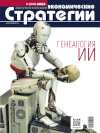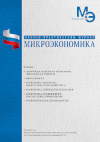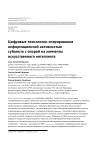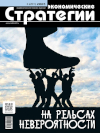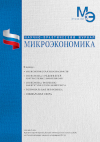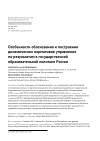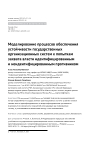Management Factor of Scientific Resources in Providing Sustainable Economic Development of High-Tech Industrial Enterprises
DOI: 10.33917/es-6.204.2025.90-99
Development of domestic enterprises producing high-tech products today is a key element in strengthening the country’s defence capability and the innovation potential of its economy. In the face of modern challenges high-tech technologies, scientific potential and highly qualified management resources of high-tech industrial enterprises are becoming the most important factors in Russia’s economic stability and security. The article examines management factor of the scientific resource of high-tech enterprises as one of the progressive potential foundations of sustainable economic development of Russia in modern conditions.
References:
1. Lopatnikov A.I. Ekonomiko-matematicheskiy slovar’: Slovar’ sovremennoy ekonomicheskoy nauki [Economic and Mathematical Dictionary: Dictionary of Modern Economics]. Moscow, Delo, 2003, 680 p.
2. Shkut’ko A. Teoriya pokoleniy po godam: A, Z, Y, X i bebi-bumery [Generational Theory by Year: A, Z, Y, X, and Baby Boomers]. Khalva-Media, 2024, 27 iyunya, available at: https://media.halvacard.ru/life/teoriya-pokolenii-po-godam#h_35721781529931719502001962
3. Astashova Yu.V. Teoriya pokoleniy v marketing [Theory of Generations in Marketing]. Vestnik YuUrGU. Seriya: Ekonomika i menedzhment, 2014, no 1, p. 108.
4. Mironova O.A. Teoriya pokoleniy kak fundament novoy paradigmy upravleniya chelovecheskimi resursami v usloviyakh postindustrializatsii ekonomiki [Theory of Generations as the Foundation of a New Paradigm of Human Resource Management in the Context of Post-Industrialization of the Economy]. Uchenye zapiski Sankt-Peterburgskogo imeni V.B. Bobkova filiala Rossiyskoy tamozhennoy akademii, 2020, no 1(73), p. 73.
5. Potekhin N.A., Potekhin V.N. O teorii marketinga novogo pokoleniya [On the Theory of Marketing of the New Generation]. AVU, 2015, no 9(139), p. 87.
6. Mishin S.I. Metodika upravleniya povedeniem potrebitelya [Methodology of Consumer Behavior Management]. Kreativnaya ekonomika, 2012, no 9(69), pp. 89–95.
7. Glavatskikh O.B., Sokolova I.H. Problemy i tendentsii innovatsionnogo razvitiya vysokotekhnologichnykh predpriyatiy v usloviyakh tsifrovoy ekonomiki: Aktual’nye voprosy ekonomiki i finansov: Sb. statey II Mezhdunarodnoy nauchno-prakticheskoy konferentsii [Problems and Trends of Innovative Development of High-Tech Enterprises in the Digital Economy: In the Collection: Current Issues of Economics and Finance: Collection of Articles of the II International Scientific and Practical Conference]. Izhevsk, 2022, pp. 140–153.
8. Global’nyy dogovor OON [The UN Global Compact]. UN, available at: unglobalcompact.org
9. Blyum M.A. Tsifrovoe predpriyatie: novye tekhnologii — novaya organizatsiya biznesa [Digital Enterprise: New Technologies — a New Business Organization]. Vestnik nauchnykh konferentsiy, 2020, no 10-1(62), pp. 17–20.
10. Goncharova N.A., Makarova N.E., Sutulova Yu.O. Tsifrovye transformatsii v sfere upravleniya personalom [Digital Transformations in the Field of Personnel Management]. Nauka i biznes: puti razvitiya, 2023, no 6(144), pp. 109–111.


